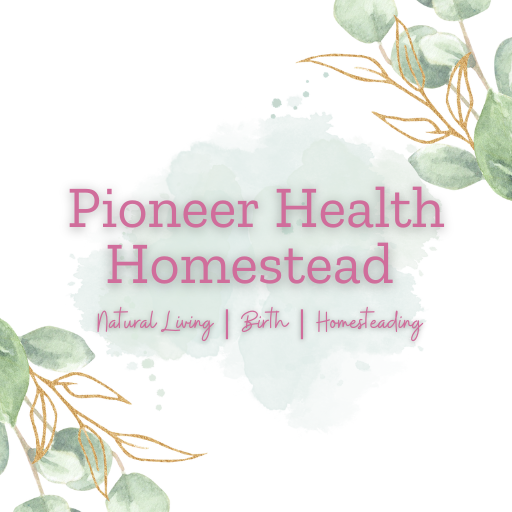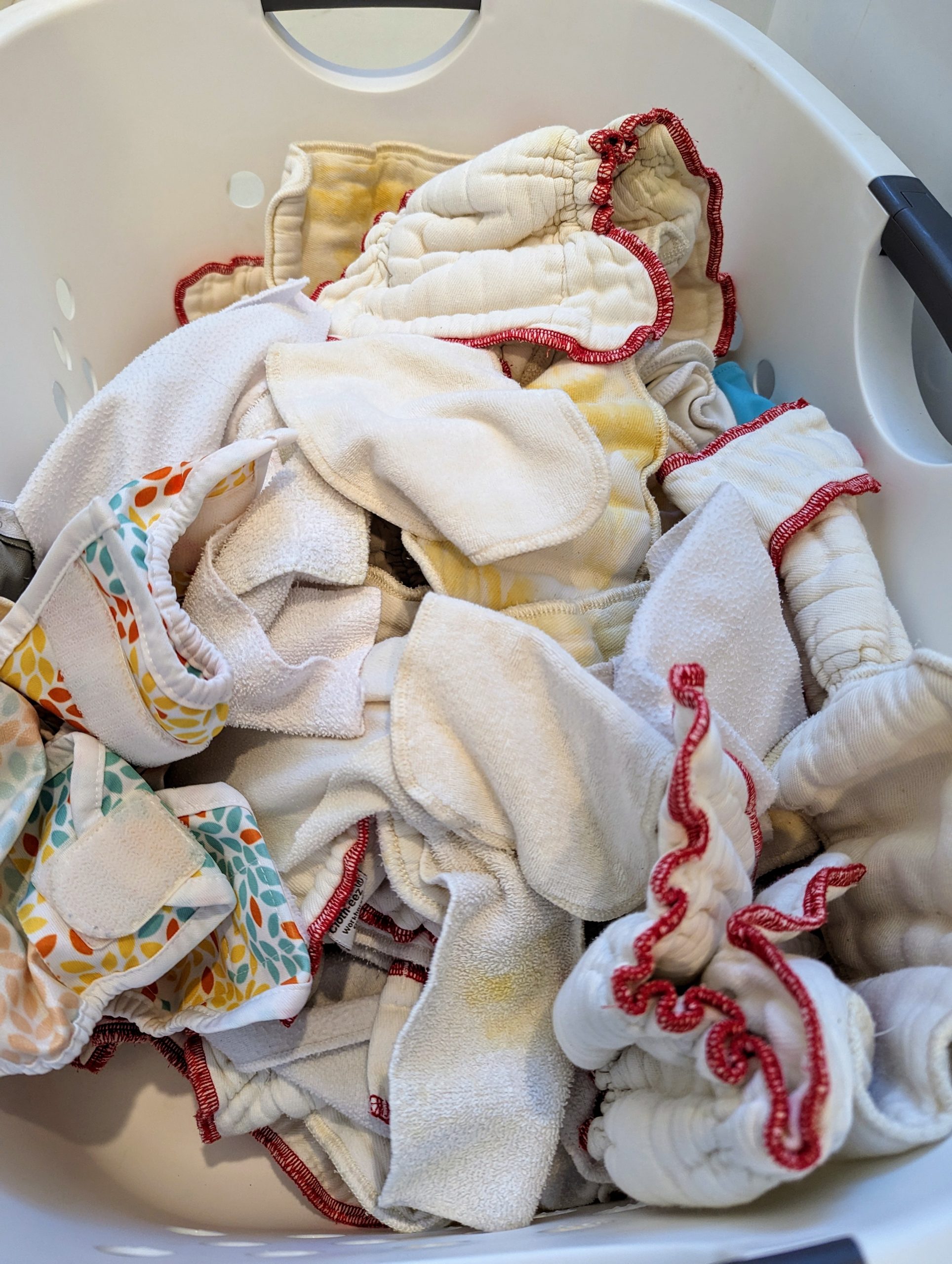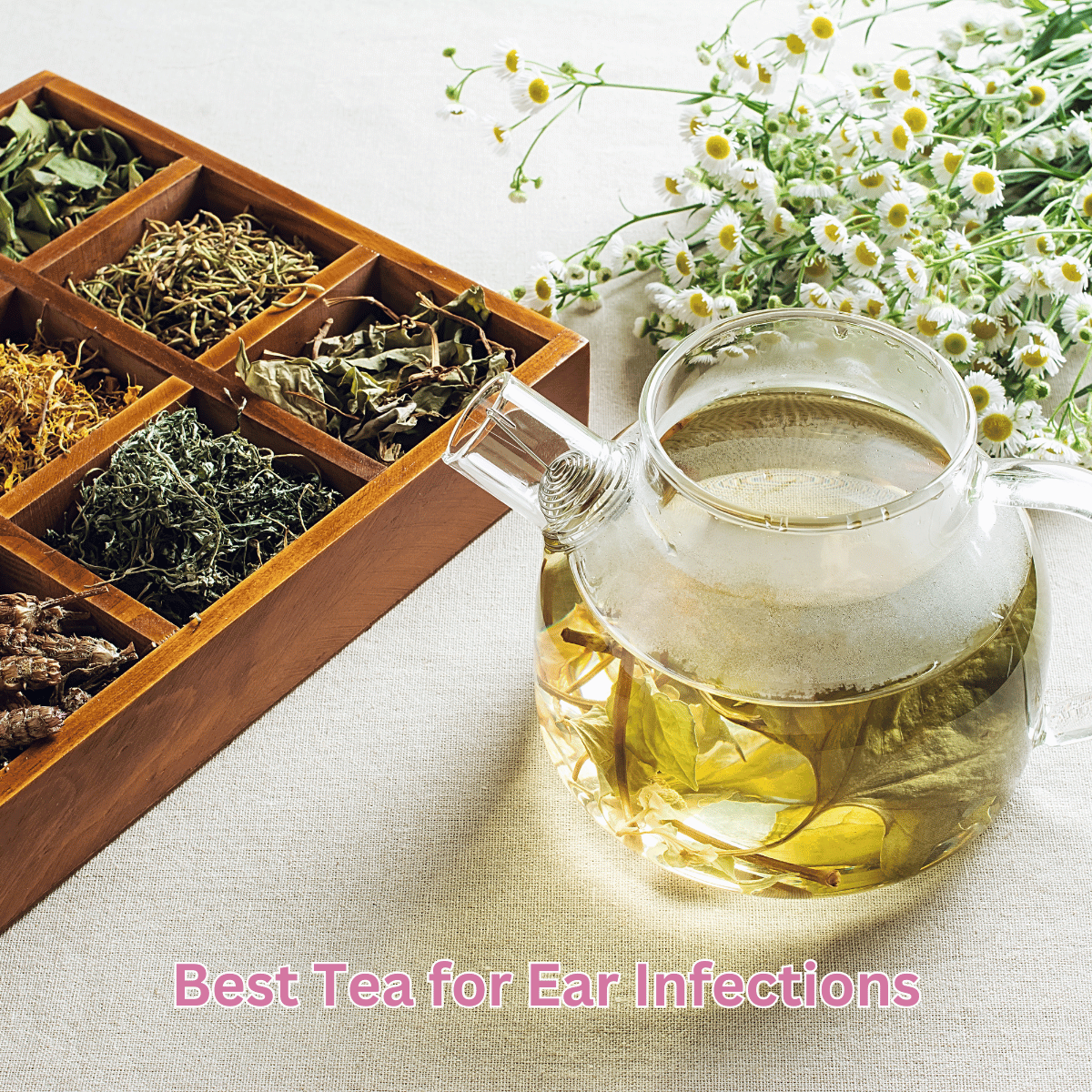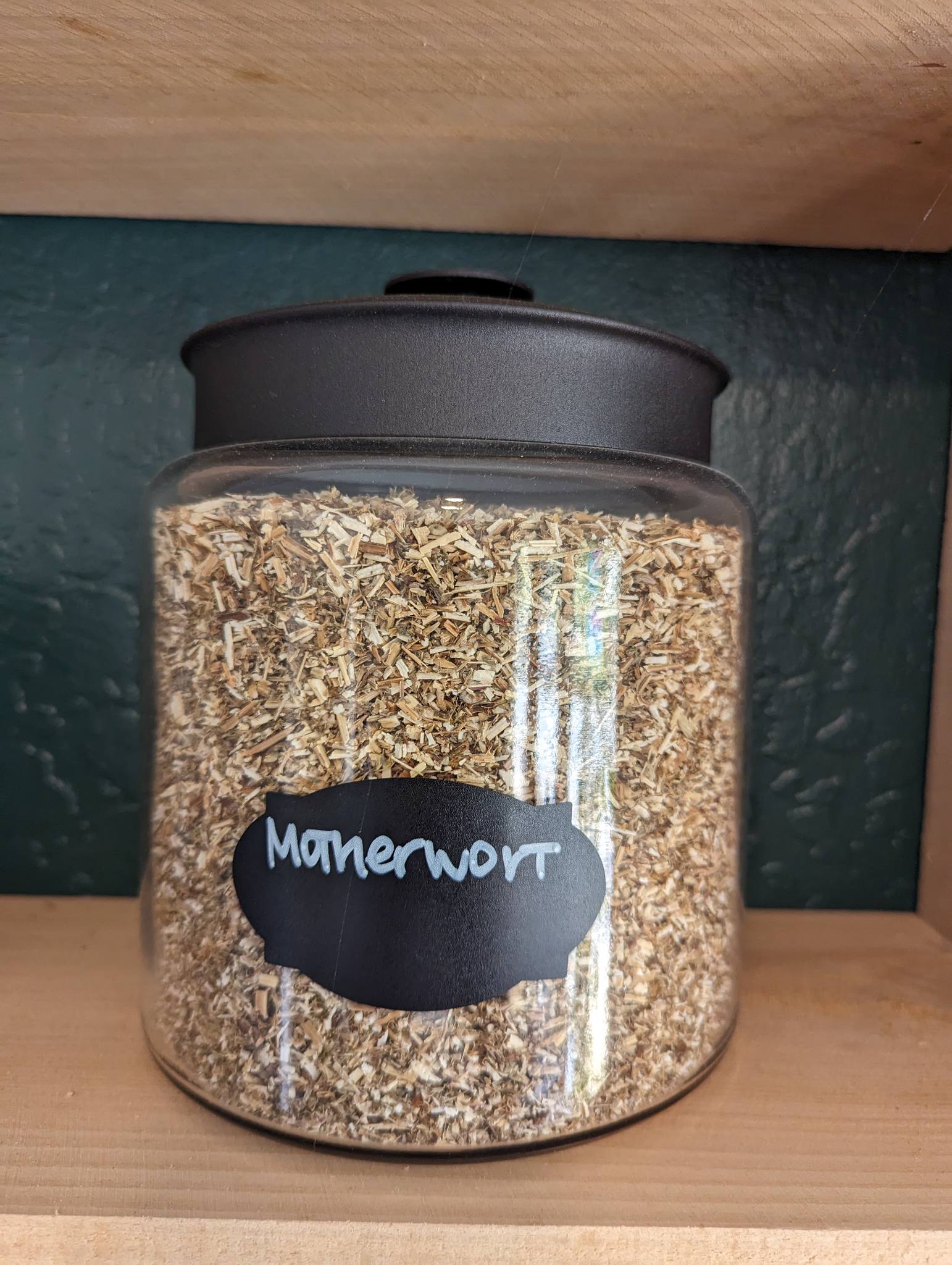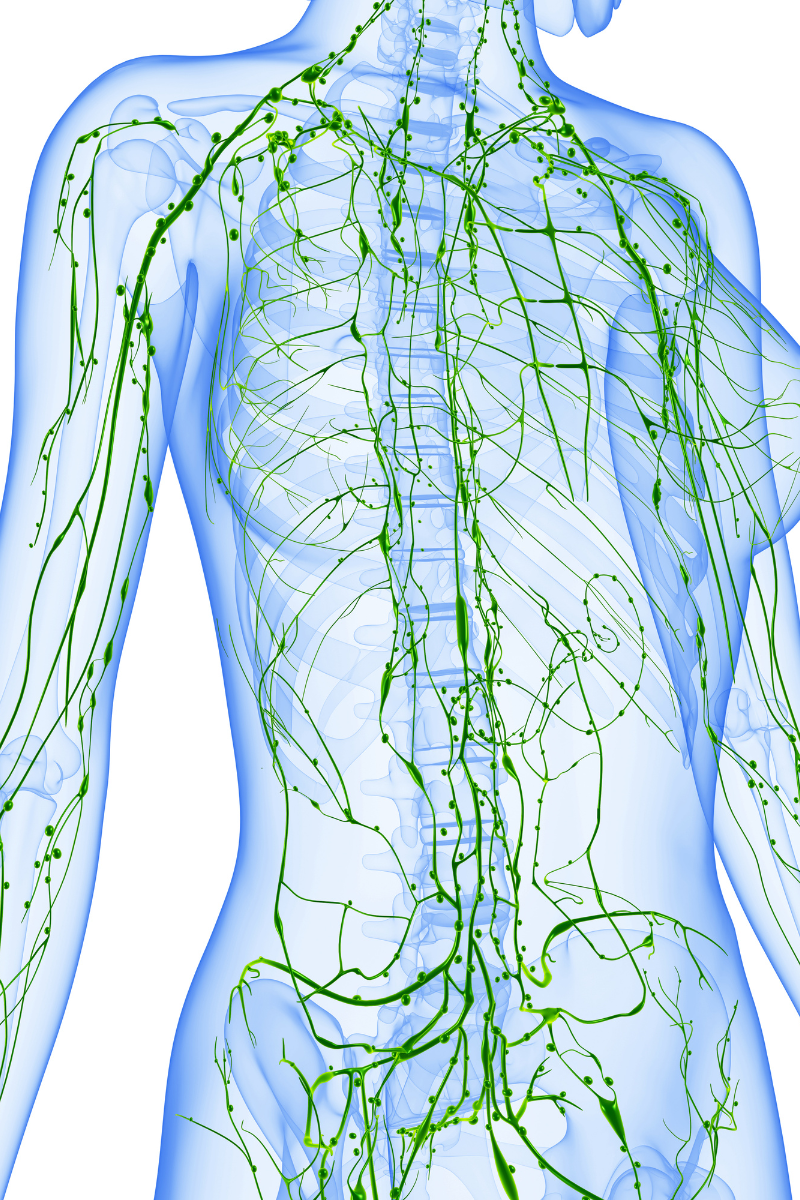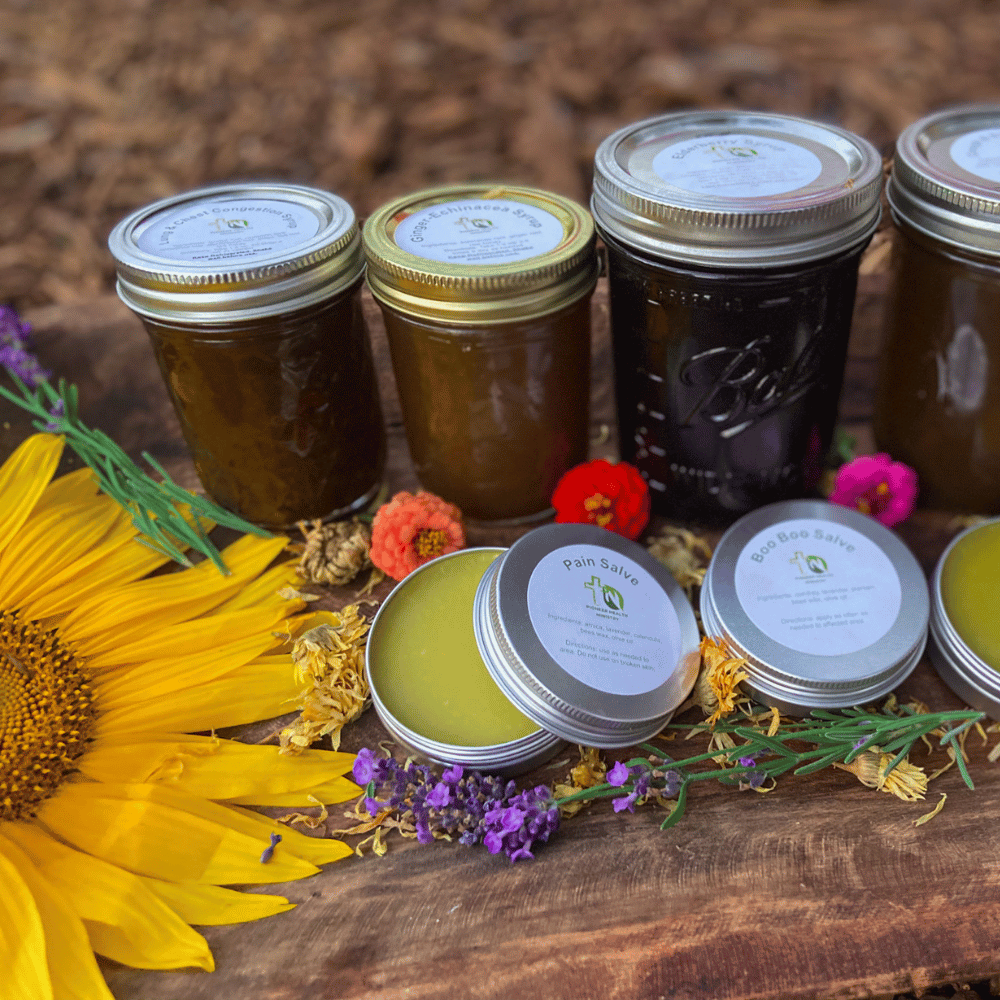Is Nettle Tea Safe During Pregnancy? What You Need to Know
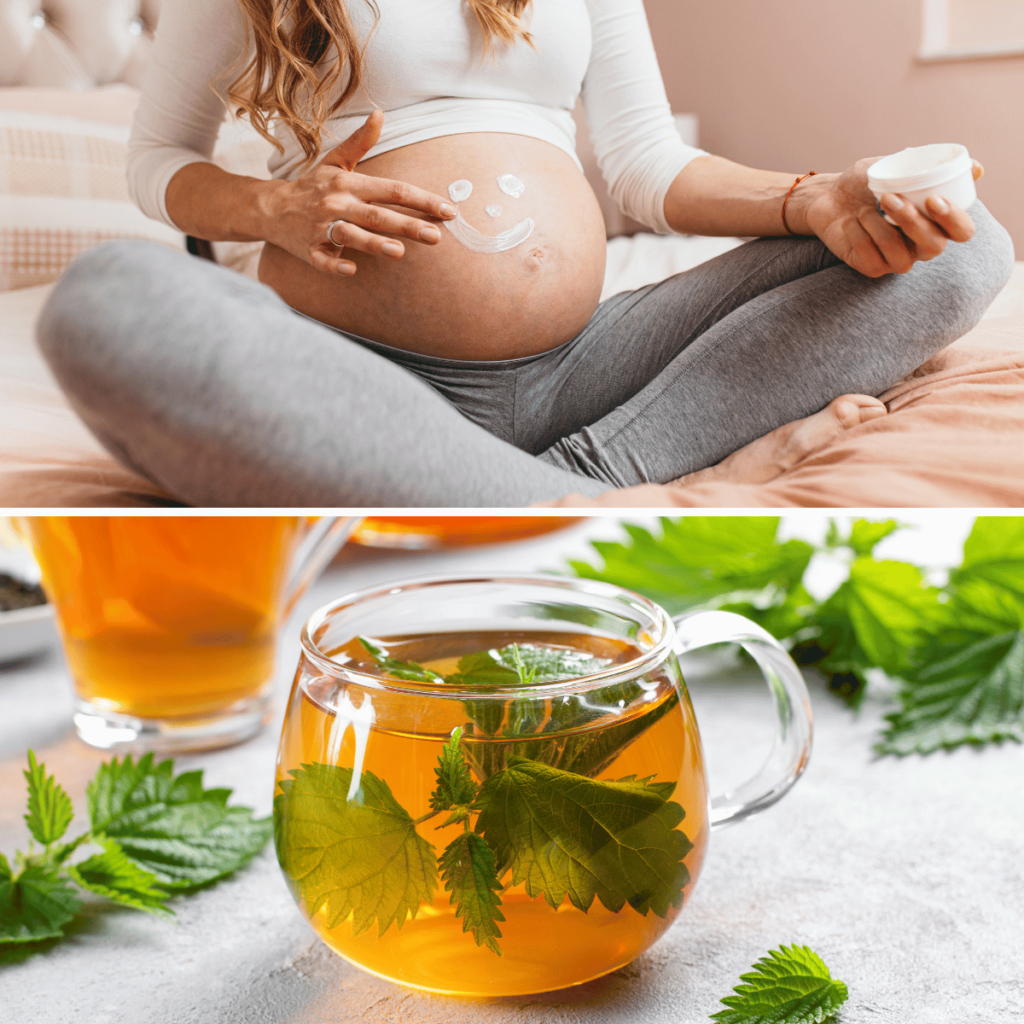
Is nettle tea safe during pregnancy? Understanding the safety and benefits of herbal teas during pregnancy is crucial for expectant mothers looking to incorporate natural remedies into their routine. Herbal medicine offers numerous potential benefits, but knowing which options are safe is essential. In this post, I’ll explore whether nettle tea, specifically Urtica dioica (stinging nettle plant), is safe during pregnancy.
Nettle tea, made from nettle leaves, is known for its high vitamin and mineral content, including iron, calcium, magnesium, protein, silicon, tannins, trace minerals, and vitamins A, B, C, D, and E. This tea blend was originally formulated with pregnancy, postpartum, and breastfeeding in mind, but it can also promote nourishment and healing for those outside these categories.
I’ll also touch on other popular pregnancy teas such as NORA tea, which includes nettle, oatstraw, alfalfa, and red raspberry leaf herbs, to provide a comprehensive view of safe herbal options for pregnant women. Whether you’re in your first trimester or the later stages of pregnancy, understanding the best herbs and their medicinal properties can help you make informed decisions for your health and well-being. Additionally, I will provide a recipe for NORA tea at the end of the blog post.
This post contains affiliate links. For more information please see our privacy policy.
Save for Later!
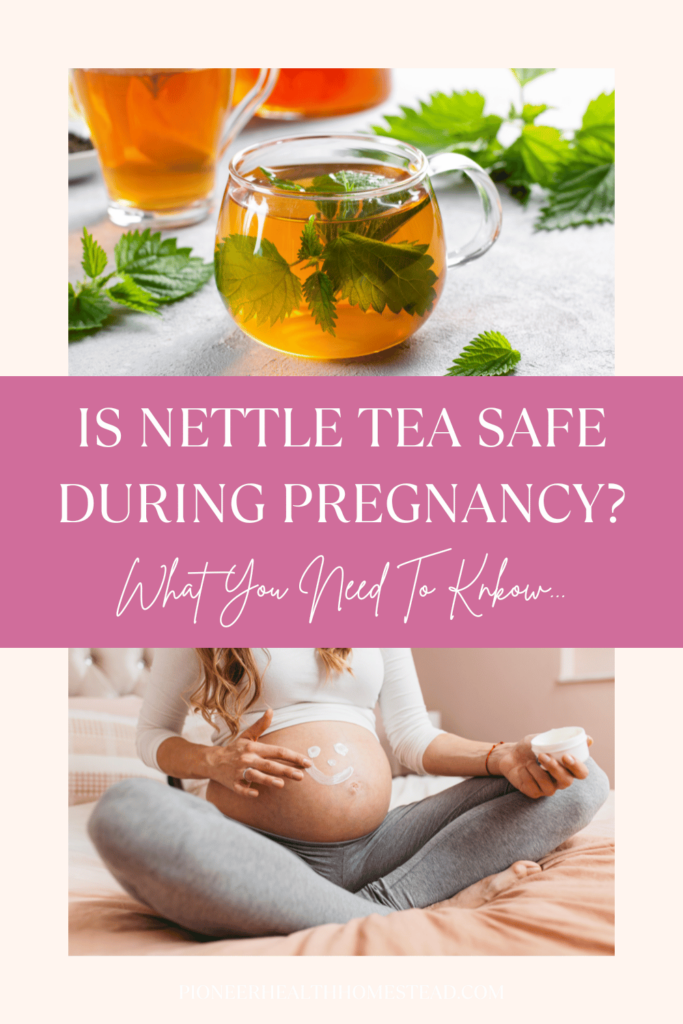
What is Nettle Tea?
Nettle tea is an herbal infusion made from the leaves of the Urtica dioica plant, commonly known as the stinging nettle. This plant has been used for centuries in traditional medicine for its wide range of health benefits. Nettle tea is typically prepared by steeping dried nettle leaves in hot water, creating a nutrient-rich beverage.
Common Uses of Nettle Tea
Nettle tea is often consumed for its medicinal properties and is a popular choice among those seeking natural remedies. Some common uses include:
- Alleviating Allergies: Nettle tea is known for its ability to reduce symptoms of hay fever and allergic rhinitis due to its natural antihistamine properties.
- Supporting Urinary Health: It is often used to help prevent urinary tract infections and support kidney function due to its diuretic effect.
- Reducing Inflammation: The anti-inflammatory properties of nettle tea make it a useful remedy for conditions like joint pain and arthritis.
- Boosting Iron Levels: Nettle tea is rich in iron, making it a great option for those looking to prevent or treat iron deficiency anemia.
- Promoting Skin Health: Due to its detoxifying properties, nettle tea can help clear up skin conditions like acne and eczema.
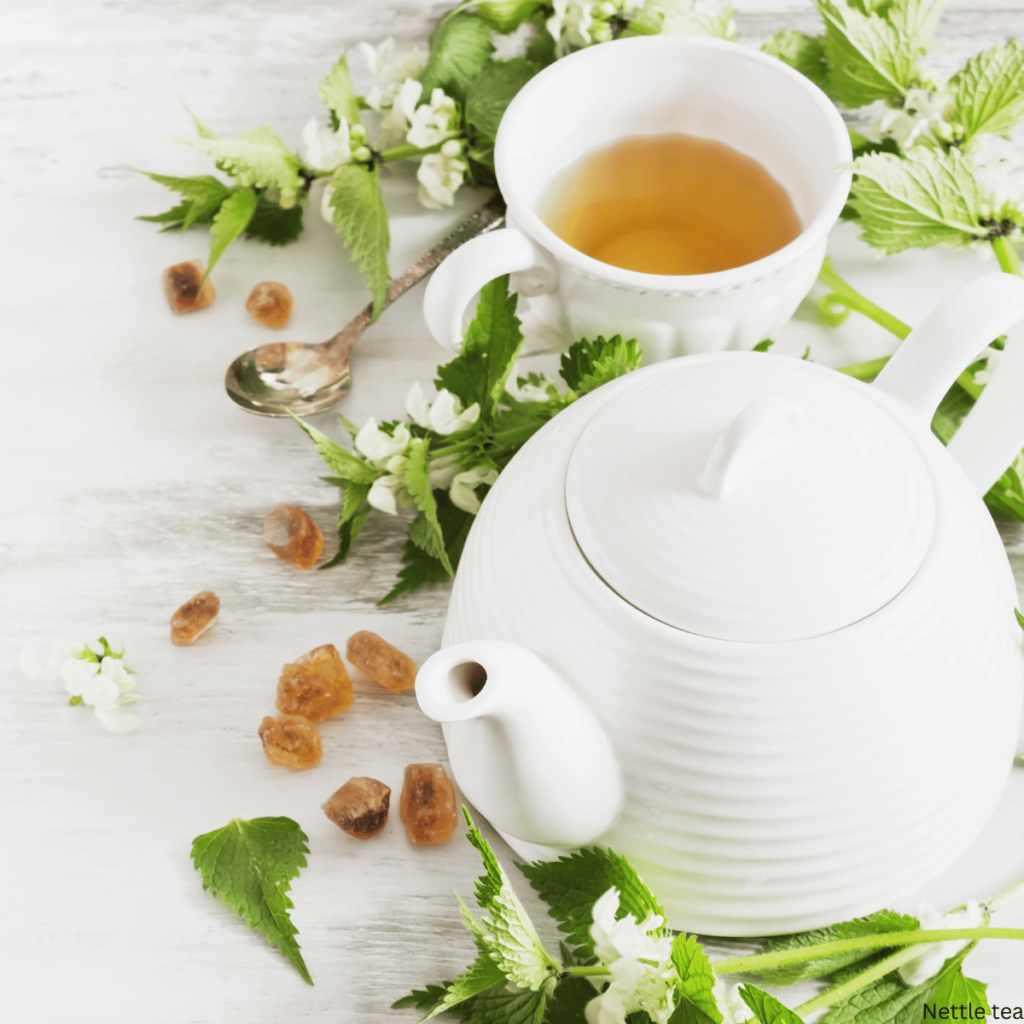
Nutritional Benefits of Nettle Leaves
Nettle leaves are packed with essential nutrients, making nettle tea a highly nutritious beverage. Some of the key nutrients found in nettle leaves include:
- Vitamin C: An antioxidant that supports the immune system and promotes healthy skin.
- Iron: Crucial for the production of red blood cells and prevention of anemia.
- Calcium: Important for bone health and proper functioning of the heart, muscles, and nerves.
- Magnesium: Supports muscle and nerve function, blood sugar levels, and blood pressure regulation.
- Protein: Provides the building blocks for muscles, skin, and other tissues.
- Silicon: Supports the health of bones, skin, and hair.
- Tannins: Have astringent properties that can help tighten tissues and reduce inflammation.
- Trace Minerals: Including zinc, copper, and selenium, which are important for various bodily functions.
- Vitamins A, B, D, and E: These vitamins support a wide range of health benefits, including vision, energy metabolism, immune function, and skin health.
The Stinging Nettle Plant
The stinging nettle plant is characterized by its fine hairs that release irritating chemicals when touched, causing a stinging sensation. Despite this, the plant is highly valued for its medicinal properties. When processed properly, the stinging effect is neutralized, allowing the leaves to be safely consumed.
Nettle has a long history of use in traditional medicine across various cultures. It’s known for its detoxifying properties, which help cleanse the body of toxins. Additionally, nettle is often used to support the health of the nervous system, improve blood circulation, and enhance the body’s overall vitality.
Incorporating nettle tea into your daily routine can be an easy way to boost your intake of essential nutrients and enjoy its medicinal properties. Whether you’re seeking relief from specific health issues or simply looking to enhance your overall well-being, nettle tea is a versatile and beneficial addition to your herbal remedy collection.
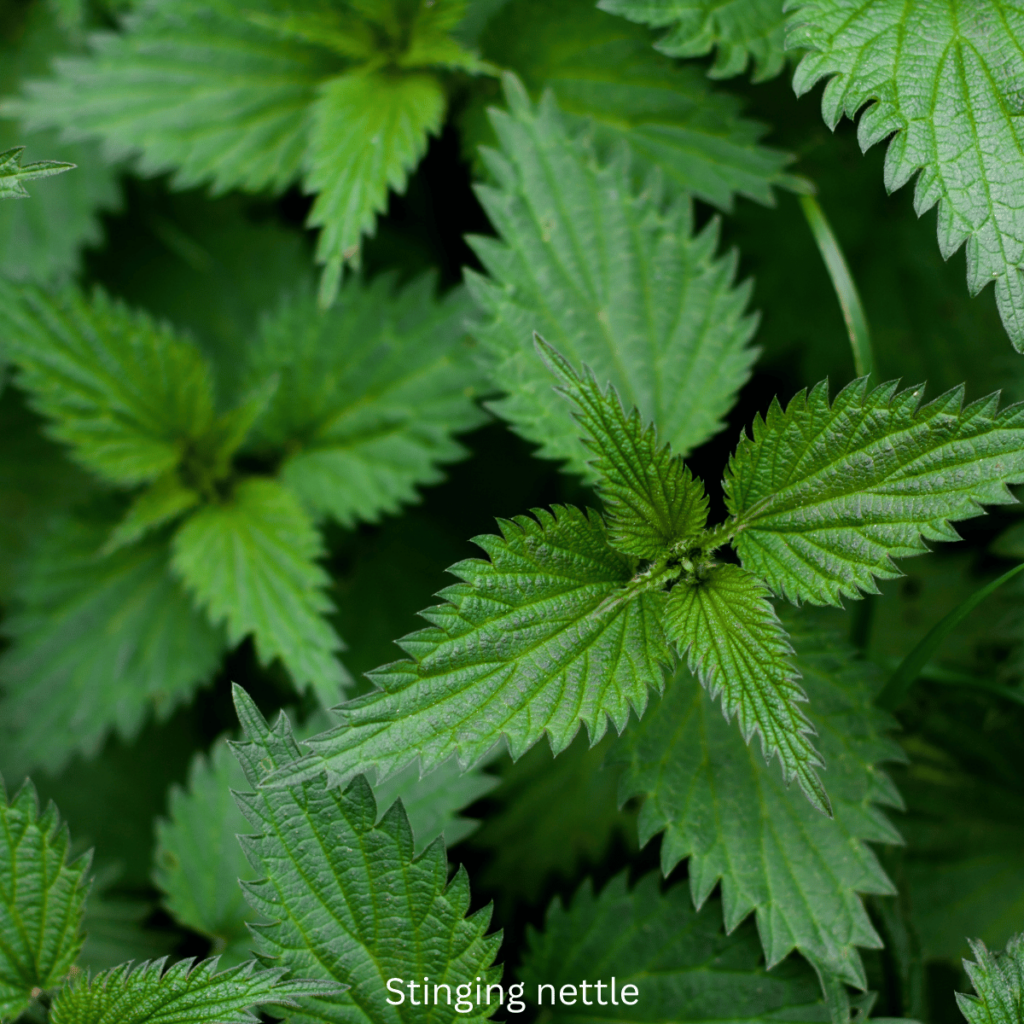
Nutritional Benefits of Nettle Tea
Rich in Vitamins and Minerals
Nettle tea stands out for its impressive nutritional profile, being exceptionally rich in essential vitamins and minerals. This makes it a powerful addition to a healthy diet. Some of the key nutrients found in nettle tea include:
- Iron: Essential for the production of red blood cells and prevention of iron-deficiency anemia. Iron is particularly important during pregnancy as it supports the increased blood volume and helps prevent fatigue.
- Calcium: Crucial for bone health, muscle function, and nerve signaling. During pregnancy, adequate calcium intake supports the development of the baby’s bones and teeth while maintaining the mother’s bone density.
- Magnesium: Vital for muscle and nerve function, blood sugar regulation, and blood pressure maintenance. Magnesium can also help reduce muscle cramps and promote relaxation.
- Protein: Provides essential amino acids needed for the growth and repair of tissues. Protein intake is important during pregnancy to support the growing fetus.
- Silicon: Supports the health of bones, skin, hair, and nails. Silicon also plays a role in collagen formation, which is important for skin elasticity.
- Tannins: Have astringent properties that can help reduce inflammation and support digestive health.
- Trace Minerals: Including zinc, copper, and selenium, which are essential for various metabolic processes and immune function.
- Vitamins A, B, C, D, and E: These vitamins contribute to a wide range of health benefits, such as vision support, energy metabolism, immune function, skin health, and antioxidant protection.
Benefits for General Health and Wellness
Nettle tea’s rich nutrient content translates into numerous health benefits, making it a valuable herbal remedy for general wellness:
- Anti-Inflammatory Properties: Nettle tea has natural anti-inflammatory effects, which can help reduce symptoms of inflammatory conditions such as arthritis, joint pain, and muscle soreness.
- Immune System Support: The high vitamin C content in nettle tea boosts the immune system, helping the body fight off infections and illnesses more effectively.
- Natural Diuretic: Nettle tea acts as a natural diuretic, promoting the excretion of excess fluids and toxins from the body. This can help reduce water retention and support kidney health.
- Detoxification: The detoxifying properties of nettle tea help cleanse the body by removing waste products and supporting liver function.
Potential Benefits of Nettle Tea During Pregnancy
Nettle tea can be particularly beneficial during pregnancy due to its high nutrient density and specific health benefits that address common pregnancy-related issues:
- Alleviating Joint Pain: The anti-inflammatory properties of nettle tea can help reduce joint pain and inflammation, which are common discomforts during pregnancy.
- Reducing Leg Cramps: The magnesium and calcium in nettle tea can help prevent and alleviate leg cramps, a frequent complaint among pregnant women, especially in the third trimester.
- Supporting Blood Pressure: Nettle tea’s nutrient content, particularly magnesium, can help regulate blood pressure, reducing the risk of high blood pressure during pregnancy.
- Boosting Iron Levels: With its high iron content, nettle tea can help prevent anemia and ensure that both mother and baby receive adequate oxygen and nutrients.
- Promoting Overall Nourishment: The essential vitamins and minerals in nettle tea support the overall health and well-being of the expectant mother, promoting a healthy pregnancy.
By incorporating nettle tea into your daily routine, you can enjoy these numerous health benefits while providing your body with a rich source of essential nutrients. Whether you are pregnant or simply looking to enhance your overall wellness, nettle tea is a versatile and nourishing choice.

Scientific Perspective
Summary of Available Scientific Research on Nettle Tea and Pregnancy
While nettle tea has a long history of use in traditional medicine, scientific research on its safety and efficacy during pregnancy is somewhat limited. However, the studies that do exist highlight several potential benefits of nettle tea, particularly due to its rich nutrient profile. Researchers have examined the overall health benefits of nettle, including its anti-inflammatory, diuretic, and nutritional properties, which can be particularly beneficial during pregnancy.
Potential Benefits and Health Benefits Supported by Research
- Boosting Iron Levels: Research indicates that nettle tea can be an excellent source of dietary iron. This is particularly important during pregnancy when the body’s demand for iron increases to support the growing fetus and placenta, as well as to increase the mother’s blood volume. Consuming nettle tea may help prevent iron deficiency anemia, a common issue in pregnancy that can lead to fatigue, weakness, and complications during delivery.
- Supporting Kidney Function: Nettle tea’s diuretic properties have been supported by scientific studies, which suggest that it can help promote urinary health by increasing urine output and flushing out toxins. This can be particularly beneficial during pregnancy, as it helps reduce the risk of urinary tract infections (UTIs), which are more common during this time.
- Anti-Inflammatory Properties: The anti-inflammatory effects of nettle have been documented in several studies. These properties can help alleviate joint pain and other inflammatory conditions, which can be exacerbated during pregnancy.
- Nutrient Absorption and Utilization: Studies have shown that the vitamins and minerals in nettle tea, such as vitamin C, calcium, and magnesium, are highly bioavailable, meaning they are easily absorbed and utilized by the body. This makes nettle tea an effective way to boost overall nutrient intake during pregnancy.
Case Reports and Studies on Nettle Tea and Its Effects on Pregnant Women
While comprehensive, large-scale studies specifically focused on nettle tea during pregnancy are sparse, there are several case reports and smaller studies that provide insights into its potential effects:
- Case Reports on Anemia Prevention: Some case reports highlight the use of nettle tea to successfully manage and prevent iron-deficiency anemia in pregnant women. These reports often note improved hemoglobin levels and reduced symptoms of anemia after regular consumption of nettle tea.
- Studies on Diuretic Effects: Research on the diuretic effects of nettle tea supports its use for managing fluid retention and edema, common issues during pregnancy. These studies indicate that nettle tea can safely increase urine output without significant side effects, helping to maintain kidney function and reduce swelling.
- General Safety Studies: Several studies on the general safety of nettle consumption have found it to be well-tolerated with minimal adverse effects. However, these studies emphasize the importance of consuming nettle in moderation and under the guidance of a healthcare provider, especially during pregnancy.
Overall, while more research is needed to fully understand the impact of nettle tea on pregnancy, existing scientific evidence suggests that it can offer several health benefits when consumed appropriately. As with any herbal remedy, pregnant women must consult with their healthcare providers before incorporating nettle tea into their routine to ensure it aligns with their individual health needs and circumstances.

Expert Opinions
Insights from Healthcare Providers and Herbalists
As a registered nurse and mother, I understand the importance of ensuring that any herbal remedy or natural supplement you consider during pregnancy is both safe and beneficial. Many healthcare providers, including obstetricians and midwives, recognize the potential benefits of nettle tea due to its rich nutrient profile. They often acknowledge its traditional use for supporting pregnancy health and its potential to alleviate common pregnancy-related discomforts like anemia, leg cramps, and fluid retention.
Herbalists such as myself, who specialize in the use of medicinal plants, frequently recommend nettle tea for its nutritional benefits and its gentle, supportive effects on the body. They often emphasize its anti-inflammatory properties, its role as a natural diuretic, and its high content of essential vitamins and minerals, which can be particularly valuable during pregnancy. Herbalists may also guide the proper preparation and dosage of nettle tea to ensure its safe use.
Recommendations from Trusted Health Organizations
Trusted health organizations, such as the American Pregnancy Association and the National Institutes of Health, provide valuable resources and guidelines on the use of herbal remedies during pregnancy. These organizations often highlight the importance of choosing herbal teas and supplements that are well-researched and known to be safe for expectant mothers.
For example, the American Pregnancy Association advises that while nettle tea can be beneficial, it should be consumed in moderation and under the guidance of a healthcare provider. This is because the safety of certain herbal ingredients can vary depending on the individual’s health status and the stage of pregnancy.
Importance of Consulting with a Healthcare Provider
As a mother, I understand the desire to seek natural remedies that can support a healthy pregnancy. However, it is crucial to consult with your healthcare provider before adding any new herbal remedy to your routine. This step is essential for several reasons:
- Personalized Medical Advice: Your healthcare provider can offer personalized advice based on your specific health needs, medical history, and pregnancy status. They can help determine whether nettle tea is a suitable option for you and advise on the appropriate dosage and frequency.
- Monitoring for Adverse Effects: While nettle tea is generally considered safe, some individuals may experience adverse effects or interactions with other medications. Your healthcare provider can monitor for any potential side effects and make adjustments as needed.
- Ensuring Safety Across Trimesters: The safety and suitability of certain herbal remedies can vary across different stages of pregnancy. What may be beneficial in the second trimester might not be recommended in the first or third trimester. Consulting with your healthcare provider ensures that you receive the most appropriate advice for your current stage of pregnancy.
- Avoiding Contraindications: Certain medical conditions or complications may contraindicate the use of nettle tea or other herbal remedies. Your healthcare provider can identify any potential contraindications and recommend alternative options if necessary.
Incorporating the insights of healthcare providers and herbalists, along with recommendations from trusted health organizations, can help you make informed decisions about using nettle tea and other herbal remedies during pregnancy. By working closely with your healthcare team, you can safely enjoy the potential benefits of nettle tea while ensuring the best possible outcomes for both you and your baby.
Practical Tips for Expectant Mothers
Guidelines for Safely Consuming Nettle Tea
When considering the inclusion of nettle tea in your pregnancy routine, it’s crucial to follow some practical guidelines to ensure safety and maximize its benefits. If your healthcare provider deems nettle tea appropriate for you, start with a small amount to see how your body reacts. A good starting point is one cup of nettle tea per day, prepared by steeping one teaspoon of dried nettle leaves in hot water for about 10 minutes. Gradually increase the amount if needed, but always stay within the recommended dosage advised by your healthcare provider.
Alternative Herbal Teas Safe During Pregnancy
In addition to nettle tea, several other herbal teas are considered safe and beneficial during pregnancy:
- Red Raspberry Leaf Tea: Known for its potential to strengthen the uterine muscles and prepare the body for labor.
- Ginger Tea: Excellent for soothing morning sickness and aiding digestion.
- Lemon Balm Tea: Offers calming effects and can help with anxiety and insomnia.
- Chamomile Tea: Generally safe but should be consumed in moderation due to potential risks of uterine contractions.
Importance of Moderation and Monitoring Caffeine Content
Moderation is key when consuming any herbal or non-herbal teas during pregnancy. Pay attention to the caffeine content of your beverages, as high caffeine intake is not recommended during pregnancy. Herbal teas typically contain less caffeine than traditional black or green teas, but it’s still important to monitor your overall caffeine consumption to ensure it remains within safe limits.
Other Natural Remedies for Common Pregnancy Issues
Beyond teas, other natural remedies can help address common pregnancy issues:
- Fruit Teas: Caffeine-free, refreshing, and nutritious options.
- Topical Use of Herbs: Applying chamomile or calendula salves can help soothe skin irritations and reduce inflammation.
Always consult with your healthcare provider before trying new herbal remedies to ensure they are safe for you and your baby. By following these practical tips and working closely with your healthcare provider, you can safely incorporate nettle tea and other herbal remedies into your pregnancy routine, supporting your health and well-being throughout this special time.
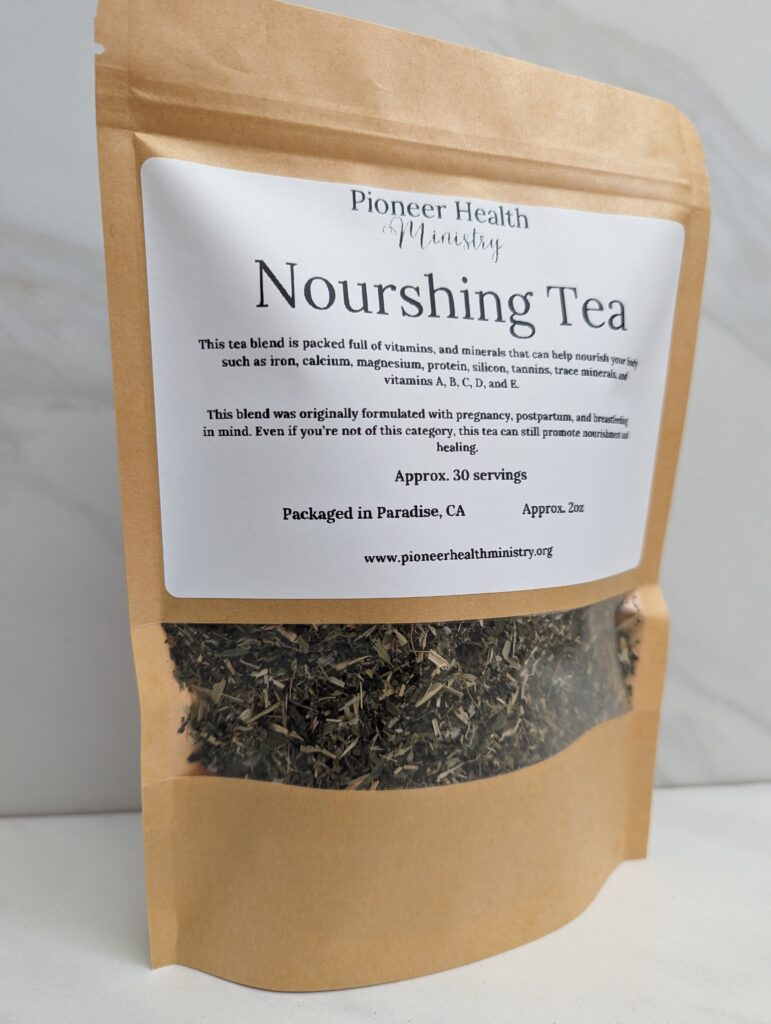
Nourishing (NORA) Tea
This is nourishing tea for everyone in the family. From young to old, man to woman, everyone can benefit from this tea. Make it as needed for a single serving, or make a larger batch and store it in an airtight container.
If you would prefer to have this tea premade and ready for you, you can find it in our online shop.
EQUIPMENT
- 1 Fine Mesh Strainer or Tea Infuser
- 1 Kettle or Pot for Boiling Water saucepan for heating water
- Measuring Spoons
INGREDIENTS
- 1 teaspoon nettle leaves
- 1 teaspoon oatstraw
- 1 teaspoon red raspberry leaves
- 1 teaspoon alfalfa leaves
INSTRUCTIONS
- Measure out 1 teaspoon each of nettle leaves, oat straw, red raspberry leaves, and alfalfa leaves. Place these herbs into a teapot or heat-resistant container.
- Boil 8 ounces (1 cup) of water. Once the water reaches a boil, pour it over the herbs in the teapot or container.
- Cover the container with a lid or a plate to retain the steam, allowing the herbs to steep for 10-15 minutes.
- After steeping, strain the tea into a cup using a fine mesh strainer or tea infuser to remove the herbs.
- Your nourishing tea is now ready to be enjoyed. You can drink it plain or add honey, lemon, or your preferred sweetener to taste.
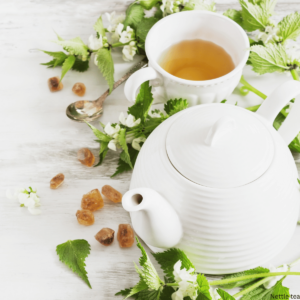
Nourishing (NORA) Tea
Equipment
- 1 Fine Mesh Strainer or Tea Infuser
- 1 Kettle or Pot for Boiling Water saucepan for heating water
- Measuring Spoons
Ingredients
- 1 teaspoon nettle leaves
- 1 teaspoon oat straw
- 1 teaspoon red raspberry leaves
- 1 teaspoon alfalfa leaves
Instructions
- Measure out 1 teaspoon each of nettle leaves, oat straw, red raspberry leaves, and alfalfa leaves. Place these herbs into a teapot or heat-resistant container.
- Boil 8 ounces (1 cup) of water. Once the water reaches a boil, pour it over the herbs in the teapot or container.
- Cover the container with a lid or a plate to retain the steam, allowing the herbs to steep for 10-15 minutes.
- After steeping, strain the tea into a cup using a fine mesh strainer or tea infuser to remove the herbs.
- Your NORA tea is now ready to be enjoyed. You can drink it plain or add honey, lemon, or your preferred sweetener to taste.
Notes
Overview
In this post, I’ve explored the safety and benefits of nettle tea during pregnancy. Nettle tea, derived from the Urtica dioica plant, is rich in essential nutrients like vitamins A, B, C, D, and E, iron, calcium, and magnesium, making it a potentially beneficial addition to your diet. Its anti-inflammatory properties, immune system support, and natural diuretic effects can be particularly advantageous during pregnancy, helping to alleviate joint pain, leg cramps, and high blood pressure.
Scientific research and expert opinions suggest that, when consumed in moderation and under the guidance of a healthcare provider, nettle tea can be a safe and nutritious choice for expectant mothers. However, it’s important to start with a small amount and gradually increase as needed, always adhering to the recommended dosage.
I also discussed other safe herbal teas during pregnancy, such as red raspberry leaf tea, ginger tea, and lemon balm tea, each offering unique benefits. Monitoring your overall caffeine intake and incorporating other natural remedies like fruit teas and topical herbs can further support your well-being during pregnancy.
Ultimately, while nettle tea can offer numerous health benefits, it is essential to seek personalized medical advice from your healthcare provider. This ensures that any herbal remedy or natural supplement you consider is safe and suitable for your individual health needs and pregnancy stage. By making informed decisions and working closely with your healthcare team, you can enjoy a healthy and nourishing pregnancy.
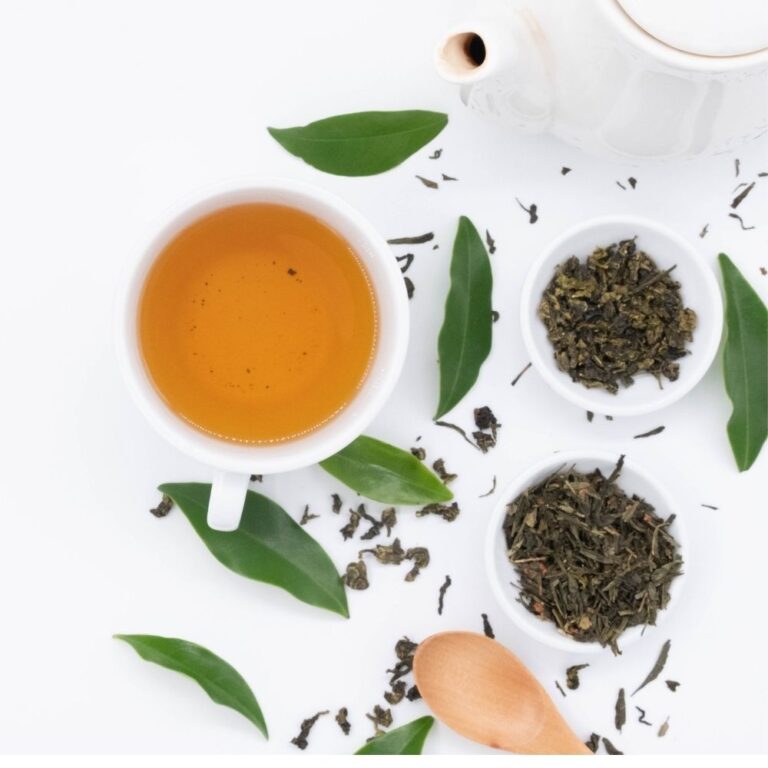
Green Tea Vs Herbal Tea: The Best Complete Tea Guide
Sharing is caring! Facebook Pinterest X Green Tea Vs Herbal Tea: The Best Complete Tea Guide Understanding the Differences Green tea vs herbal tea is a popular debate among tea lovers worldwide. Both offer unique flavors, health benefits, and caffeine content. Tea has a rich history and is enjoyed in many cultures. From Chinese green…
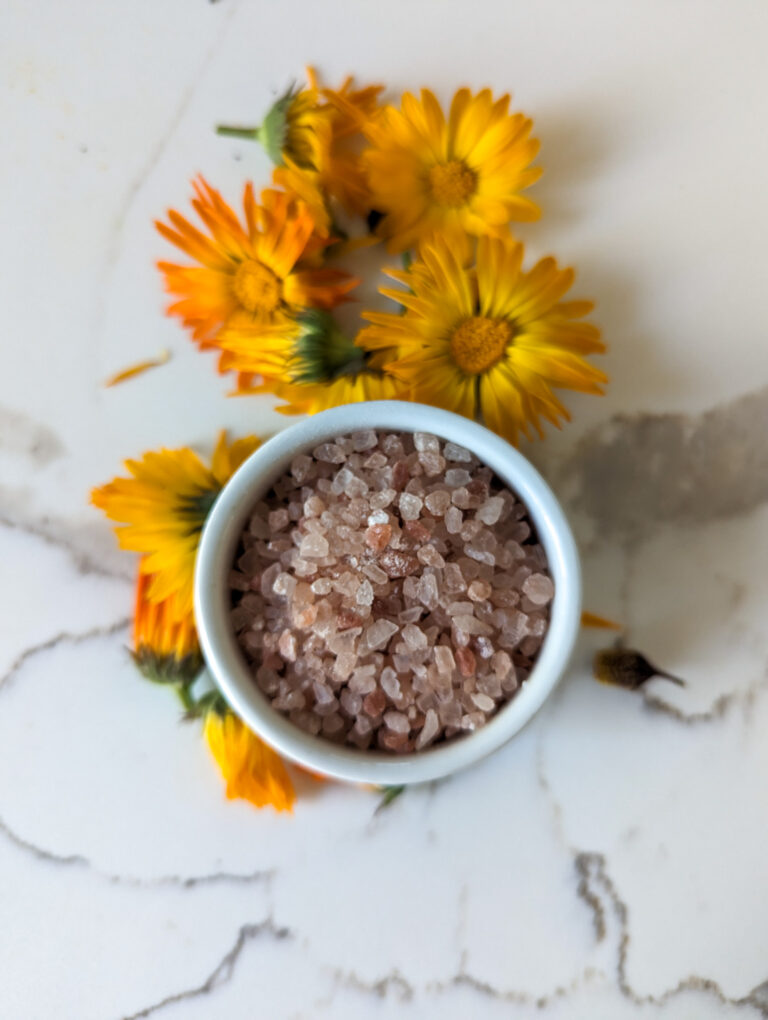
How to Make Bath Salts Without Epsom Salt: Free Recipe
How to Make Bath Salts Without Epsom Salt: Free Recipe How to Make Bath Salts Without Epsom Salt Homemade bath salts without Epsom salt are a great way to enjoy a luxurious soak. You can use natural ingredients like coarse sea salt, baking soda, and pink Himalayan salt for a soothing experience. A relaxing bath…
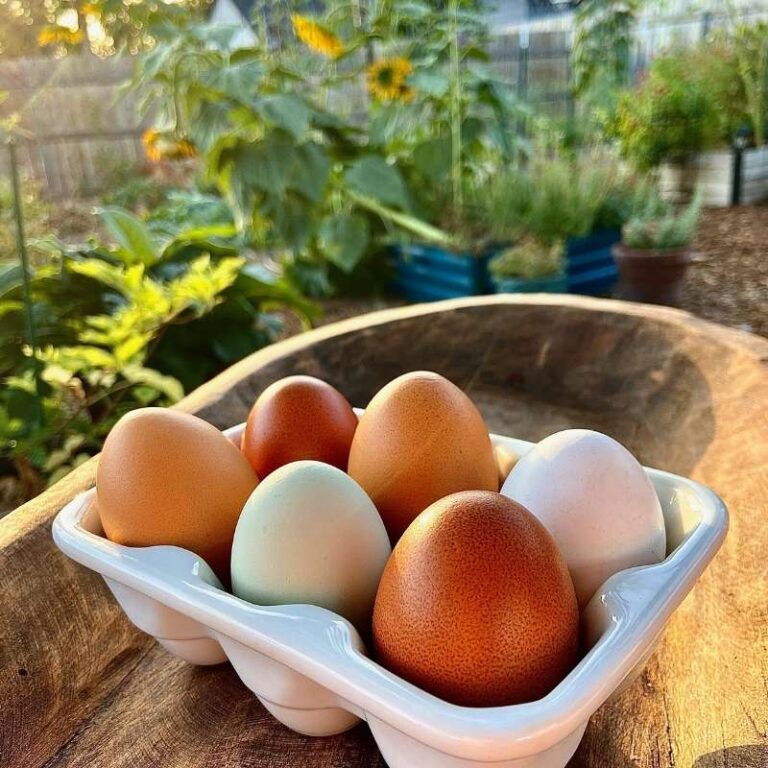
Homesteading in California: How to Start at Any Stage
Homesteading in California: How to Start at Any Stage How Homesteading in California is Possible Homesteading in California is a journey that looks different for everyone, depending on where you live in this vast and diverse state. From the deserts dotted with Joshua trees in the south, to the rugged mountain ranges in the north,…
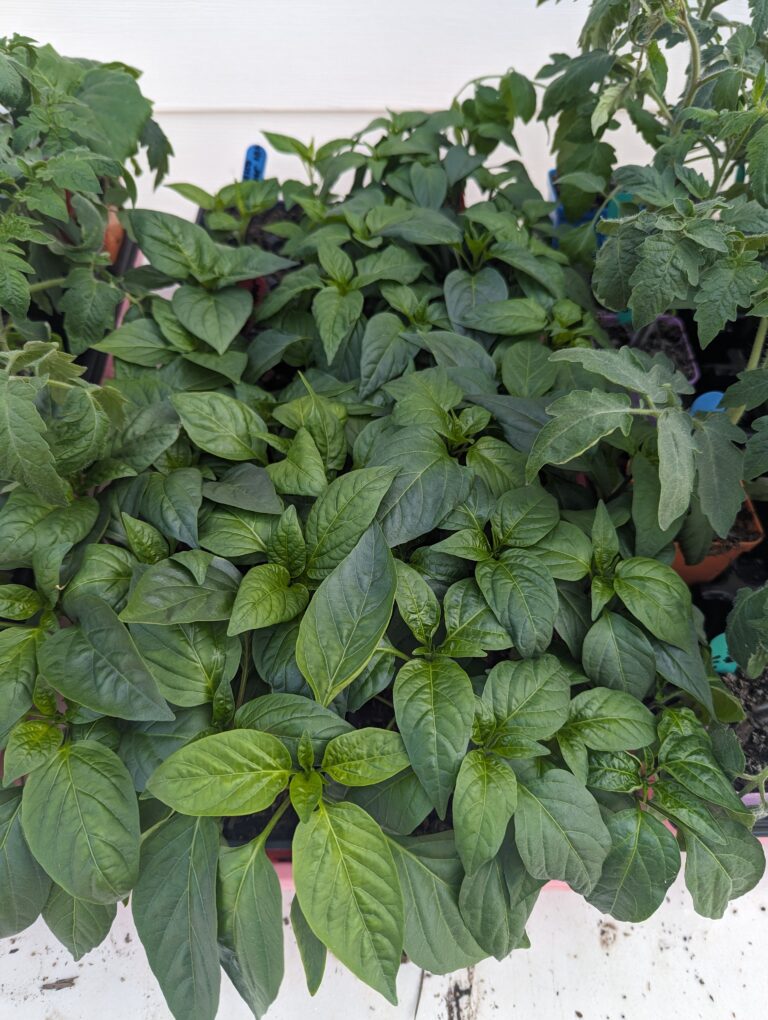
How to Make Peppers Grow Faster: Guide and Easy Tips
How to Make Peppers Grow Faster: Guide and Easy Tips How to make peppers grow faster is a common question among home gardeners seeking to maximize their growing season. Whether you’re nurturing sweet peppers, green peppers, or hot pepper plants, creating ideal conditions is essential for pepper success. The best way to achieve healthy pepper plants…
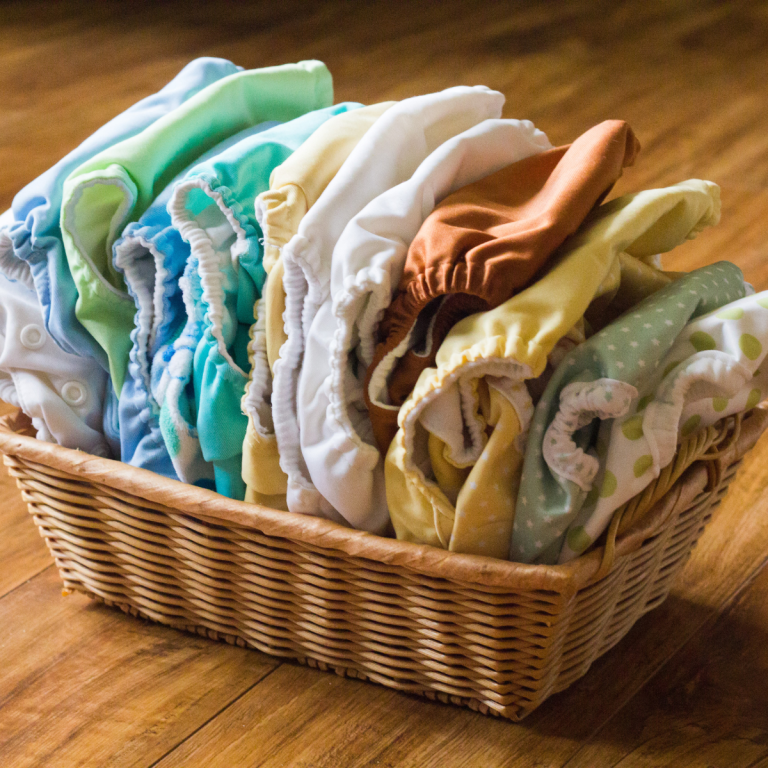
The Different Types of Cloth Diapers: Ultimate Guide
The Different Types of Cloth Diapers: Ultimate Guide The different types of cloth diapers offer a sustainable and eco-friendly alternative to disposable diapers for your baby. As a mom of five and a Registered Nurse, I’ve seen the many benefits of reusable cloth diapers firsthand. This guide will help you understand the major types of…
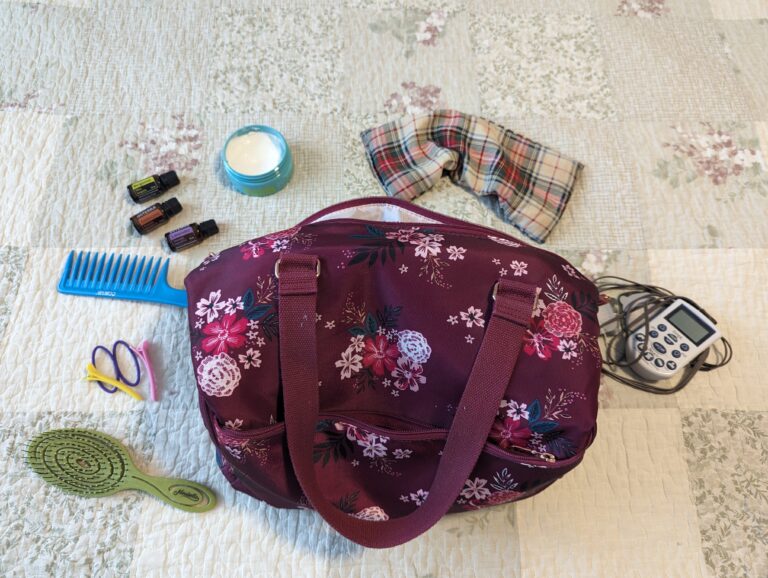
The Best Doula Bag Essentials Kit for Birth and Postpartum
The Best Doula Bag Essentials Kit for Birth and Postpartum The Best Doula Bag Essentials Kit for Birth and Postpartum A well-stocked doula bag is essential for supporting women during birth and postpartum. As a Registered Nurse, mother of five, and former Navy Hospital Corpsman, I’ve experienced the birthing world from many angles. I’ve worked…
